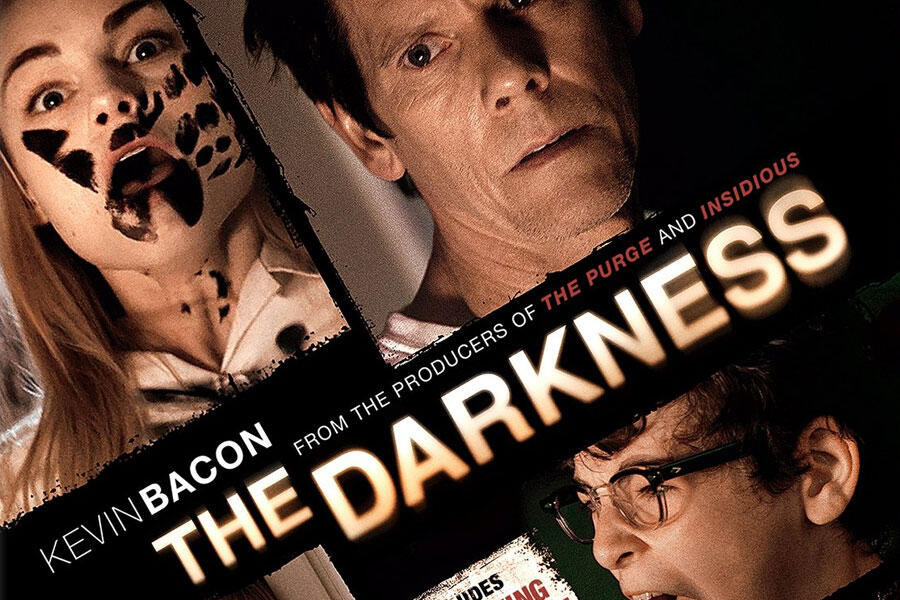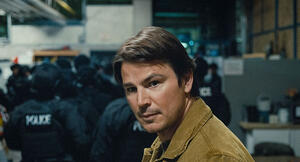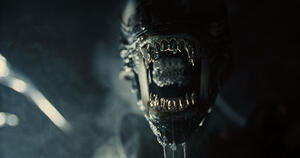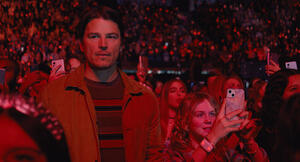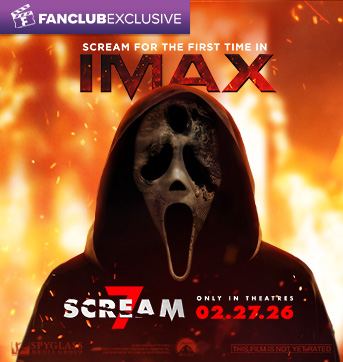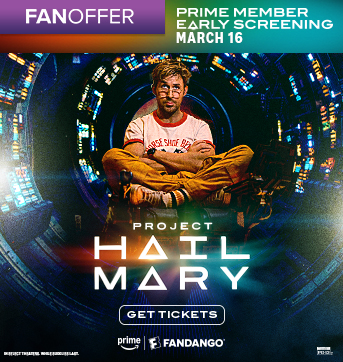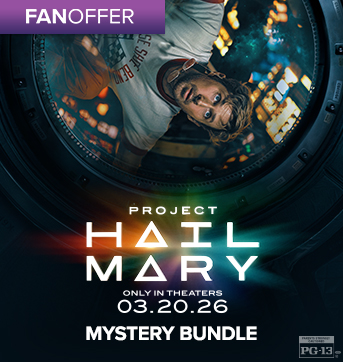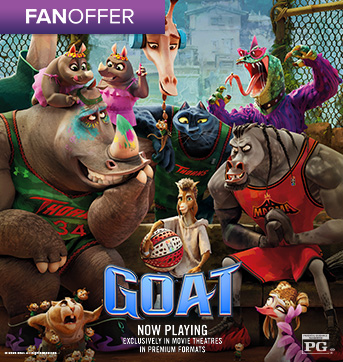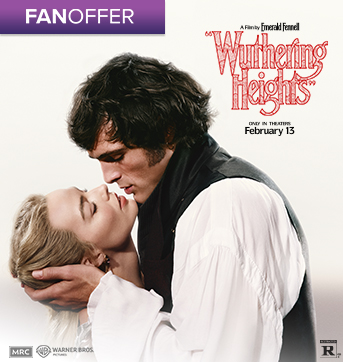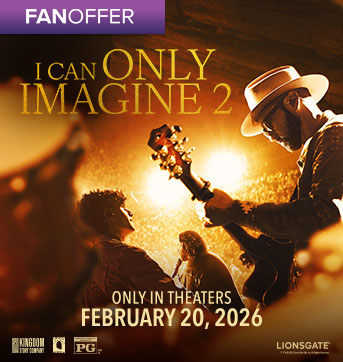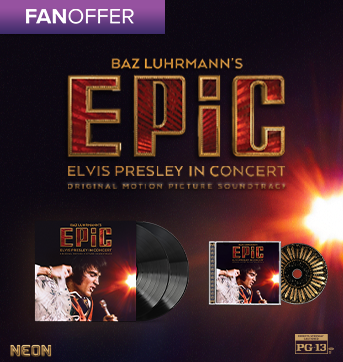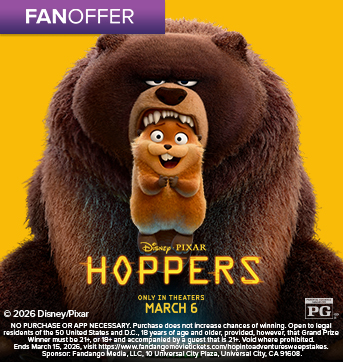
Australian director Greg McLean (Wolf Creek, Rogue) is known for making horror movies that don't exactly shy away from the gruesome stuff. If you like horror movies, but get a bit squeamish when the violence hits a certain limit, his movies typically aren't for you. If that is the case, McLean's latest movie, The Darkness, may finally land in that genre sweet spot for you.
Starring Kevin Bacon (Tremors) and Radha Mitchell (Pitch Black), The Darkness is McLean's first supernatural horror movie. There are no terrifically violent murders, no gruesome animal attacks--just an increasingly unhinged story about a family facing forces beyond this world after their son secretly steals Native American artifacts from a sacred site in the Grand Canyon.
The Darkness hits Blu-ray, DVD and FandangoNow this week, which afforded us the opportunity to talk to McLean about the real story (and psychic medium) that influenced the movie and its original ending that horrified audiences. Oh, and if you are worried that McLean's turned his back on his more nihilistic brand of horror, we also talked about a movie he has premiering at the Toronto International Film Festival this weekend. It's called The Belko Experiment, was written by Guardians of the Galaxy director James Gunn, and promises to be a hard-core, horrific time.
Fandango: How close is The Darkness to the original story someone told you?
McLean: There are two stories. I was told a firsthand account of a haunting that took place in a house in Sydney, Australia. The thing I took from that, and that informed the tone of this story, was how this was just a mundane, everyday family that was kind of screwed up and had these bizarre things happening. What I took from that was how ordinary these situations can be before they happen.
And then after that, I heard another story about people who had taken artifacts from this sacred site in Australia called Ayers Rock, which is an Aboriginal site. They'd taken stones back to their house and then all these strange, weird things started happening and the only thing they could do to stop it was take the stones back to the location where they'd found them.
And then I found out the same stories were happening in the Grand Canyon, so when we moved the story from Australia to the U.S., I looked into it further and realized there's a whole series of stories about people taking Native American artifacts and having things like a bad-luck streak infect the family. So we just took that from one culture to another.
Fandango: How much research did you put in to the sequence where the psychic tries to cleanse the house?
McLean: We enlisted the help of a psychic medium, a guy called Michael Kouri in Los Angeles. You're usually either a medium or a psychic, but Michael is actually both. He's a very interesting guy and he professionally clears houses for a living and deals with spirits, ghosts and the undead. We enlisted him through a friend at the script stage. He read it and said, "Well, this isn't really accurate." So I asked him what he needed, and he basically re-created the entire sequence with what he actually does. Some of the items used in the kit the ladies use are his actual items. And they're all based on accurate ways to dispel evil spirits from a house. He was on set with us every day we were doing that stuff. To me it's more interesting if you can make things more realistic. Obviously this does dive into some pretty weird territory, but we did base this on how things really happen and I think that authenticity is appreciated by audiences.
Fandango: The Blu-ray contains a radically different alternate ending. Why the change?
McLean: We shot the movie as it was scripted with that ending and we all thought it was really cool and some people would love it. It's obviously much darker, a much different tone. We shot it and tested it pretty early and audiences hated it. You can't kill Kevin Bacon, apparently. I thought it would be groundbreaking and cool, but audiences have a really innate sense of justice and they felt the family didn't deserve this. They had problems, yeah, but they basically didn't do anything wrong. It's a very nihilistic ending, and look, I've made some very nihilistic movies so I'm kind of into it, but I learned the audience just isn't into it if it isn't earned. So we changed it.
Fandango: Which ending do you prefer?
McLean: I'm a bit... I don't know. Maybe on my next movie I'll really go there. With this one, people just really liked the characters and found it offensive to have it end that way. I'm kind of conflicted about it. Part of me thinks we should have just pushed through and gone with that ending. It's always tough. With these films, there's obviously a lot of these kind of stories, so you try to do something a bit different in the space. I'm conflicted. I like both. I do like seeing the demons and those figures a bit more as well. I was always fascinated with those.
Ultimately we were just trying to make a better movie. It's tricky. People just love Kevin Bacon, and they really just wanted to murder me for harming him that way. You can't hurt the Bacon.

Fandango: James Gunn called The Belko Experiment the most intense and uncompromising script he'd ever written. What can people expect?
McLean: Oh, God. I think he summed it up. I watched it again last night, and it's a really wild script. When my agent sent me the script, I read it and e-mailed him saying, "Why are you wasting my time with scripts that people are never going to make? There's no way this is ever going to get made." And he said, "No, no, they're shooting it. It's being made in a couple months." I really thought he was joking. It's so outrageous and so fantastic. So I just flipped. It's an amazing script. It's so funny, so dark, so clever. So then I told him, whatever it takes to get on this movie, just get me a meeting with these guys.
It's kind of hard to categorize. It's a wild ride. It's funny as hell, it's confronting it, it's got a lot of really interesting thematic things it talks about. It's a wild movie. I can't wait to see how it goes this weekend.
Fandango: You went from making a movie every few years, to making The Darkness, The Belko Experiment and Jungle pretty much back-to-back. Why the sudden flurry of activity?
McLean: After I did Rogue in 2007 I took a couple of years where I didn't direct a movie because I was developing things. I was attached to a couple of bigger movies, and they never happened. Sometimes you put a lot of time and energy into things and they never happen, so I got very frustrated with that. After Wolf Creek 2, I had such a good time making that movie I just totally changed my approach. I wasn't going to waste anymore time chasing things or attaching myself to things for years hoping they would happen. I just got frustrated. My philosophy now is that I'm kind of inspired by Steven Soderbergh or Woody Allen and how they're just always making movies, even if they're low budget. That's what I want to do with my time. I love making movies. I'm filling my time with making movies.
Fandango: What's next after The Belko Experiment and Jungle?
McLean: I don't know. I'm looking for a cool script. I'm really interested in sci-fi. I'd love to do a big action film. We'll see what comes next. I'm also still fascinated with the supernatural, and feel like I really only dipped my toe in with The Darkness. Who knows, maybe next time I'll let everyone die at the end.
The Darkness is out now on Blu-ray, DVD and FandangoNow.
